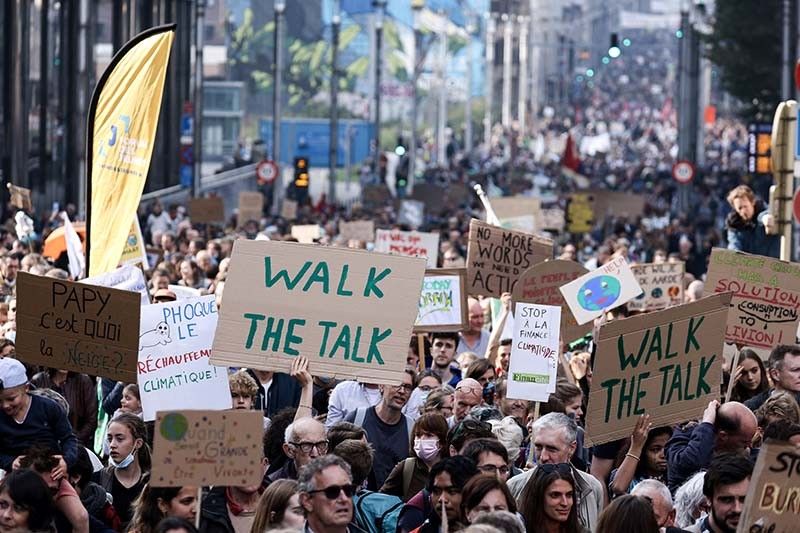Latest climate plans worlds away from 1.5C target — UN

PARIS, France — Countries' latest climate plans will deliver just a tiny percentage of the emissions cuts needed to limit global heating to 1.5C, the United Nations said on Tuesday in a damning assessment ahead of the COP26 climate summit.
Just days before the Glasgow meeting, which is being billed as crucial for the long-term viability of the Paris climate deal, the UN's Environment Programme said that national plans to reduce carbon pollution amounted to "weak promises, not yet delivered".
In its annual Emissions Gap assessment, UNEP calculates the gulf between the emissions set to be released by countries and the level needed to limit temperature rises to 1.5C—the most ambitious Paris Agreement goal.
The summit's organizers say they want countries to commit to keeping Earth on course for the 1.5C goal through redoubled pledges to decarbonize their economies.
But according to UNEP, even the most up-to-date and ambitious plans from around 120 countries puts the world on track to warm 2.7C.
UN chief Antonio Guterres said Tuesday's report showed that the world was "still on track for climate catastrophe".
"As world leaders prepare for COP26, this report is another thundering wake-up call. How many do we need?"
Under the 2015 Paris deal, signatories are required to submit new emissions-cutting plans—known as Nationally Determined Contributions, or NDCs—every five years, each more ambitious than the last.
UNEP said that most recent commitments would shave 7.5 percent off previously predicted 2030 emissions levels.
To keep on a 1.5C trajectory, a 55-percent reduction is needed, it said.
A 30-percent cut is needed for 2C of warming, a threshold the Paris deal commits nations to keep temperatures "well below".
"To stand a chance of limiting global warming to 1.5C, we have eight years to almost halve greenhouse gas emissions," said UNEP Executive Director Inger Andersen.
'Imminent peril'
UNEP said that the COVID-19 pandemic led to an "unprecedented" 5.4-percent drop in global emissions in 2020.
However, even this was not enough to narrow the gap between humanity's current emissions trajectory and a 1.5C world.
Putting the challenge into stark perspective, it said that countries needed to slash CO2 and its equivalent in other greenhouse gases by an additional 28 billion tonnes by 2030; carbon dioxide emissions alone are projected to hit 33 billion tonnes in 2021.
Report co-author Anne Ohloff told AFP that it showed there had been "some progress" on emissions since the Paris Agreement.
"The new (NDC) commitments shave off 4 Gigatonnes of CO2 equivalent annually by 2030 compared to the last ones," she said.
"But it's far from sufficient, of course. Overall we are very far from where we should be."
The Intergovernmental Panel on Climate Change in August said that Earth could hit the 1.5C threshold as soon as 2030 and be consistently above it by mid-century.
The report on Tuesday said that even if all net-zero pledges were delivered in full, there was a 66-percent chance that temperature rises could be limited to 2.2C.
"There is no appetite for reducing fossil fuel consumption globally at the rate required to meet our climate goals," said Myles Allen, professor of Geosystem Science at the University of Oxford.
This year's Emissions Gap report focused on the role in global heating played by methane, the most potent greenhouse gas.
It found that existing technical measures could reduce man-made methane emissions by 20 percent per year, with little or no additional cost to industry.
It also said that the plans of many of the 49 countries that have made net-zero pledges remained "vague and not reflected in NDCs".
"Overall, a net zero goal must be accompanied by immediate policy action towards ambitious 2030 targets," said Joanna Depledge, from the Cambridge Centre for Environment, Energy and Natural Resource Governance.
"Otherwise, it is mere virtue signalling."
- Latest






























